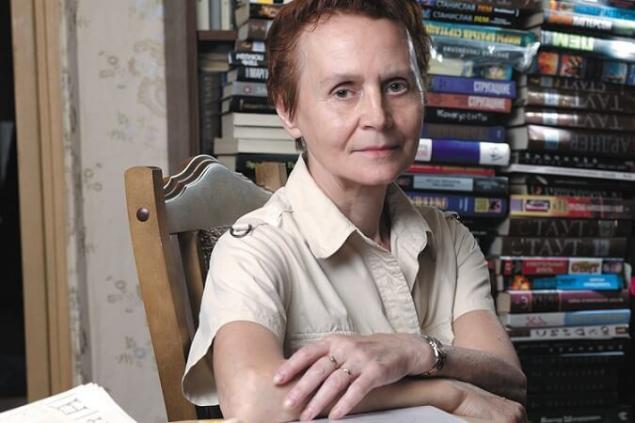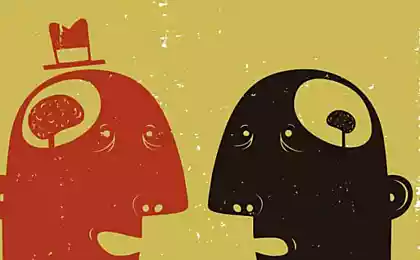640
Lyudmila Yasyukova: less than 20% of people have a full conceptual thinking
Head of St. Petersburg State University social psychology laboratory, head of the center "Diagnosis and skills development" also Lyudmila Yasyukova more than twenty years of experience the school psychologist. She presented the results of monitoring of the intellectual development of students. Below is a fragment of her interview.

- You are responsible for monitoring the intellectual development of pupils and students, and, define the intellectual development on the basis of formation of conceptual thinking. What is the conceptual thinking?
- The origins of this concept to be found in the works of outstanding Soviet psychologist Lev Vygotsky. Conceptual thinking can be defined by three important points. The first - the ability to highlight the essence of the phenomenon, the object. Second - the ability to see reason and to predict the consequences. The third - the ability to organize information and build a complete picture of the situation
. Those with conceptual thinking, to adequately understand the real situation and make the right conclusions, and those who do not have ... They also believe in the correctness of his vision of the situation, but this is their illusion, which is divided on the real life. Their plans are not implemented, the forecasts do not come true, but they believe that the blame for the surrounding people and circumstances rather than their misunderstanding of the situation.
The degree of formation of conceptual thinking can be determined with the help of psychological tests, including IQ. Here is an example of testing of children six to seven years, which is not always cope and adults. Tit, dove, bird, sparrow, duck. What is superfluous?
Unfortunately, many people say that the duck. I have recently been the parents of one child, hot, argued that the duck - the correct answer. Dad - lawyer, mother - a teacher. I tell them: "Why a duck?" And they say, because it is large, and the bird, the bird is, in their opinion, something small. But what about the ostrich, penguin? And after all, they have fixed in the mind of the image of the birds as something small, and they believe their way universal.
- And what percentage of our compatriots are able to allocate and see causal relationships
? - According to my information and according to other researchers, less than 20% of people have a full conceptual thinking. They are those who studied the natural and technical sciences, learned Operations allocation of essential features, categorization and the establishment of cause-and-effect relationships.
They are, however, among the decision-makers on the development of society is not enough. Among political consultants have psychologists, philosophers failed teachers - people who have a conceptual way of thinking is not very good, but who know how to speak cleverly and wrap their ideas in a beautiful wrapper
. On a life form conceptual thinking is not possible, it is sold only in the study of science, since science itself built on the conceptual principle: they are based on the basic concepts on which is built the pyramid science. And if we get out of school without any conceptual thinking, then, when confronted with this or that fact, we can not interpret it objectively and act under the influence of emotions and our subjective perceptions.
As a result of the decisions taken on the basis of such preconceptual interpretation of what is happening, it is impossible to implement. And we see it in our lives. The higher in the social hierarchy there is a person, the more expensive the price of its biased interpretations and decisions. Look how much we have adopted programs that does not end. It has been a year or two and where the program where the person who declared it?
- Endemic problem of the modern school - hyperactive children with so-called ADHD (attention deficit hyperactivity disorder)
. - ADHD - it's not a diagnosis. Previously, it was called MMD - minimal brain dysfunction, even before PEP - post-natal encephalopathy. This particular behavior, manifested in the most different pathologies.
In 2006, we formally adopted the American point of view on this issue and the logic of the treatment. And they think it's 75-85 %% genetically caused complication, leading to behavior disorders. They prescribed medications, stimulants, which should compensate for these disorders.

However, the study doctors of medical sciences Boris Romanovich Yaremenko and Yaroslav Nikolaevich Bobko indicate that the main problem of the so-called ADHD - in spine disorders: sprains, instability, poor Maturity. Children clamped vertebral artery and a so-called steal effect when blood flow is reduced resulting not only in the vertebral artery and in the carotid arteries that supply the frontal lobe. The child's brain constantly receives less oxygen and nutrients.
This leads to short cycle efficiency - three to five minutes after the brain shuts down and then only after some time is switched back. The child is not aware of what is going on a trip with the associated fights and various tricks, which he does not remember because they are developed in moments of disconnection of brain activity.
The effect of disabling brain is normal, we are all confronted with this when listening to a boring lecture or read something complicated and suddenly catch myself on the fact that the disabled. The only question is, how often and at what times they come off. We shut down for a second, and a child with ADHD for three to five minutes.
To help children with ADHD, it is necessary to correct the spine, often it is the first cervical vertebra.
On the other hand, even if the problem with the spine and improving blood supply to the brain is not able to solve, you can always go the way of thinking. Higher functions, as proven internationally recognized psychologist Lev Vygotsky, can compensate for the lower level. And I have seen many examples when thinking through the development achieved by the payment problems with attention and short-cycle performance. So never give up is not necessary.

- You are responsible for monitoring the intellectual development of pupils and students, and, define the intellectual development on the basis of formation of conceptual thinking. What is the conceptual thinking?
- The origins of this concept to be found in the works of outstanding Soviet psychologist Lev Vygotsky. Conceptual thinking can be defined by three important points. The first - the ability to highlight the essence of the phenomenon, the object. Second - the ability to see reason and to predict the consequences. The third - the ability to organize information and build a complete picture of the situation
. Those with conceptual thinking, to adequately understand the real situation and make the right conclusions, and those who do not have ... They also believe in the correctness of his vision of the situation, but this is their illusion, which is divided on the real life. Their plans are not implemented, the forecasts do not come true, but they believe that the blame for the surrounding people and circumstances rather than their misunderstanding of the situation.
The degree of formation of conceptual thinking can be determined with the help of psychological tests, including IQ. Here is an example of testing of children six to seven years, which is not always cope and adults. Tit, dove, bird, sparrow, duck. What is superfluous?
Unfortunately, many people say that the duck. I have recently been the parents of one child, hot, argued that the duck - the correct answer. Dad - lawyer, mother - a teacher. I tell them: "Why a duck?" And they say, because it is large, and the bird, the bird is, in their opinion, something small. But what about the ostrich, penguin? And after all, they have fixed in the mind of the image of the birds as something small, and they believe their way universal.
- And what percentage of our compatriots are able to allocate and see causal relationships
? - According to my information and according to other researchers, less than 20% of people have a full conceptual thinking. They are those who studied the natural and technical sciences, learned Operations allocation of essential features, categorization and the establishment of cause-and-effect relationships.
They are, however, among the decision-makers on the development of society is not enough. Among political consultants have psychologists, philosophers failed teachers - people who have a conceptual way of thinking is not very good, but who know how to speak cleverly and wrap their ideas in a beautiful wrapper
. On a life form conceptual thinking is not possible, it is sold only in the study of science, since science itself built on the conceptual principle: they are based on the basic concepts on which is built the pyramid science. And if we get out of school without any conceptual thinking, then, when confronted with this or that fact, we can not interpret it objectively and act under the influence of emotions and our subjective perceptions.
As a result of the decisions taken on the basis of such preconceptual interpretation of what is happening, it is impossible to implement. And we see it in our lives. The higher in the social hierarchy there is a person, the more expensive the price of its biased interpretations and decisions. Look how much we have adopted programs that does not end. It has been a year or two and where the program where the person who declared it?
- Endemic problem of the modern school - hyperactive children with so-called ADHD (attention deficit hyperactivity disorder)
. - ADHD - it's not a diagnosis. Previously, it was called MMD - minimal brain dysfunction, even before PEP - post-natal encephalopathy. This particular behavior, manifested in the most different pathologies.
In 2006, we formally adopted the American point of view on this issue and the logic of the treatment. And they think it's 75-85 %% genetically caused complication, leading to behavior disorders. They prescribed medications, stimulants, which should compensate for these disorders.

However, the study doctors of medical sciences Boris Romanovich Yaremenko and Yaroslav Nikolaevich Bobko indicate that the main problem of the so-called ADHD - in spine disorders: sprains, instability, poor Maturity. Children clamped vertebral artery and a so-called steal effect when blood flow is reduced resulting not only in the vertebral artery and in the carotid arteries that supply the frontal lobe. The child's brain constantly receives less oxygen and nutrients.
This leads to short cycle efficiency - three to five minutes after the brain shuts down and then only after some time is switched back. The child is not aware of what is going on a trip with the associated fights and various tricks, which he does not remember because they are developed in moments of disconnection of brain activity.
The effect of disabling brain is normal, we are all confronted with this when listening to a boring lecture or read something complicated and suddenly catch myself on the fact that the disabled. The only question is, how often and at what times they come off. We shut down for a second, and a child with ADHD for three to five minutes.
To help children with ADHD, it is necessary to correct the spine, often it is the first cervical vertebra.
On the other hand, even if the problem with the spine and improving blood supply to the brain is not able to solve, you can always go the way of thinking. Higher functions, as proven internationally recognized psychologist Lev Vygotsky, can compensate for the lower level. And I have seen many examples when thinking through the development achieved by the payment problems with attention and short-cycle performance. So never give up is not necessary.
30 fresh anecdotes that positive charge for the whole weekend!
Celebrities of friendship which we did not know























